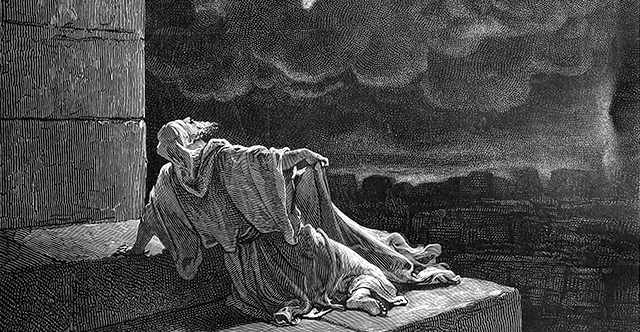This article is part of a series on Old Testament Christophanies. For important background information, see An Introduction to Old Testament Christophanies–with Justin Martyr.

After Elijah’s nemesis Ahab died, his son Ahaziah became king of Israel. Ahaziah walked in the evil way of his father and mother, Jezebel (1 Kgs 22:51–52). In 2 Kings 1, the king was severely injured after falling through a window lattice in his palace in Samaria. Ahaziah sent messengers to ask Baal-zebub, the god of Ekron, if he would recover (v. 2).
Meanwhile, the divine Angel had some instructions for Elijah:
But the angel of the LORD said to Elijah the Tishbite, “Arise, go up to meet the messengers of the king of Samaria and say to them, ‘Is it because there is no God in Israel that you are going to inquire of Baal-zebub, the god of Ekron?’ Now therefore thus says the LORD, ‘You shall not come down from the bed where you have gone up, but you shall surely die.’” Then Elijah departed (2 Kgs 1:3–4).
Ekron, located on the Philistine border near Samaria, was home to the idol Baal-zebub. Baal-zebub means “lord of the flies.”[1] Worship of this false god eventually led to the downfall of Ekron (Amos 1:8; Zeph 2:4; Zech 9:5). The Angel’s question for Ahaziah’s messengers was rhetorical, for He was God in Israel. The question emphasized the absolute denial of Yahweh that came with consulting Baal-zebub.
Ahaziah’s messengers reported the Lord’s words back to him. Ahaziah asked what the man looked like who gave them the Lord’s message and the messengers answered that he was hairy and wore a leather girdle. Upon hearing this, the king knew it was Elijah. Then Ahaziah sent a captain with fifty soldiers to capture or even kill Elijah. The soldiers found the prophet on a hill. On behalf of the king, they called Elijah a man of God and told him to come down. Elijah answered that if he was a man of God then fire would come down from heaven and consume the soldiers. Sure enough, fire came down and destroyed them. Ahaziah sent a second captain and set of fifty soldiers, and the same events happened again. Ahaziah then sent a third captain with another fifty soldiers. Only this time the captain fell to his knees and begged Elijah, a man of God, to spare his life and the lives of the soldiers. At that moment the Angel of the Lord told Elijah to let the captain take him to the king. Once face to face with Ahaziah, Elijah was able to directly tell the king the same thing he had told the messengers. Because Ahaziah sought an answer from Baal-zebub, he would never recover, and he would die in his bed. Soon after, Ahaziah died “according to the word of the LORD” spoken by Elijah (vv. 5–17).
The “god” Baal-zebub was, in reality, a mask for Satan. Satan is referred to in the Gospels by the Greek variation Beelzebul (e.g., Matt 12:24; Mark 3:22). Jesus Himself spoke of Satan and Beelzebul as the same being (e.g., Luke 11:18). In their opposition to one another, Elijah and Ahaziah were proxies for the masters they served. The true conflict was between the Angel of the Lord and Satan. Ahaziah sought out Satan, so the Son of God became Ahaziah’s adversary.
[1] It is commonly thought that the name implies that this god was an averter of flies. However, it could have been used in reference to the Babylonian practice of divination by observing the movement of flies.

Good article. I used this same story as one of two where Elijah brings down fire from heaven as well as Moses who brought the plagues on Egypt as indicative of the Law and Prophets – the two witnesses of Revelation 11.
Thank you sir. This one was a short entry, but the content brings an interesting dynamic to the series. Moses and Elijah certainly are paired in unique ways.